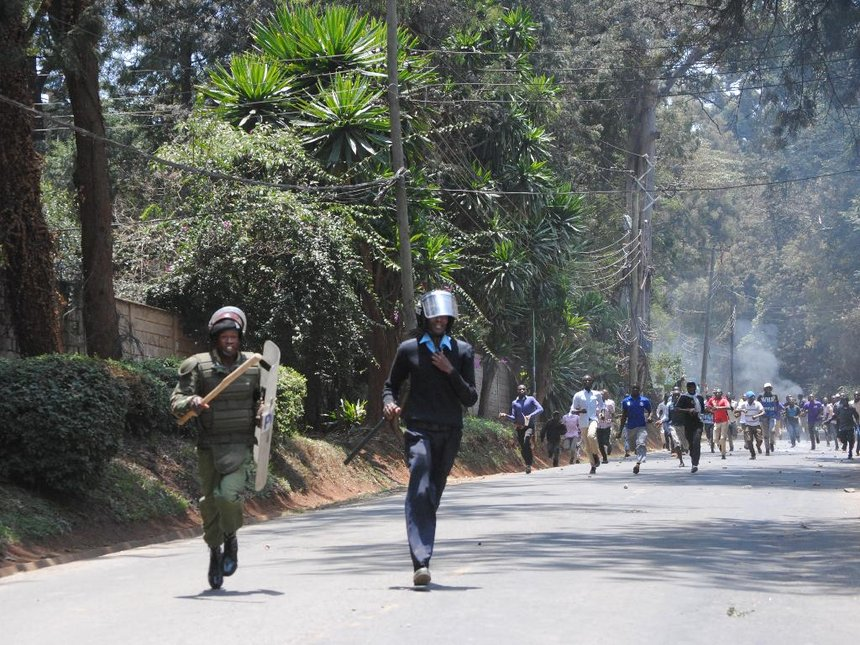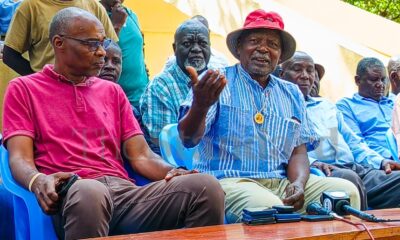News
UON Students Revolt! Demand Sh43,000 Hostel Fee Cut, Vow Total University Shutdown!
This astronomical jump has occurred against a backdrop of deteriorating hostel conditions that students describe as a perfect storm of neglect and exploitation.

The gates of the University of Nairobi may soon echo with the silence of defiance rather than the bustling energy of academic pursuit, as the institution’s student body draws battle lines over accommodation fees that have surged from a modest Sh6,000 to a staggering Sh43,000 in just four years.
In a dramatic press briefing that captured the raw frustration of Kenya’s brightest minds, the University of Nairobi Students Association delivered an ultimatum that threatens to paralyze not just the country’s oldest and most prestigious university, but potentially bring Nairobi’s Central Business District to a standstill.
The message was crystal clear and uncompromising: accommodation fees must fall, or there will be no University of Nairobi.
UNSA President Troy Rusana painted a grim picture of desperation as he addressed the media on Monday, his voice carrying the weight of thousands of students who find themselves caught between their academic dreams and harsh financial realities.
“We are here because we are in pain and have nowhere to sleep,” Rusana declared, his words cutting through any notion that this is merely another routine student protest.
The numbers tell a story of institutional transformation gone awry.
What began as affordable accommodation at Sh6,000 in 2021 has exploded into a financial burden of Sh43,000 annually, representing a seven-fold increase that has left many students questioning whether higher education remains accessible to ordinary Kenyan families.
This astronomical jump has occurred against a backdrop of deteriorating hostel conditions that students describe as a perfect storm of neglect and exploitation.
The accommodation crisis extends far beyond mere affordability.
Student leaders paint a disturbing picture of university hostels that have become monuments to institutional decay, with unpainted rooms, squeaky beds, and untiled floors serving as daily reminders of administrative indifference.
These substandard conditions have forced some students to seek alternative accommodation in unsafe areas around the university, exposing them to security risks that no student should have to navigate while pursuing their education.
Elisha Wasike, the association’s Secretary General and a medical student, captured the broader implications of this crisis when he noted how poor hostel conditions had pushed students into precarious living situations.
The irony is palpable: students paying premium prices for substandard accommodation are being forced to seek refuge in areas where their safety cannot be guaranteed.
The student leadership’s strategy extends beyond traditional protest tactics.
In a move that signals the depth of their commitment, they have called upon incoming first-year students to delay their reporting, effectively asking them to sacrifice their immediate academic prospects for the promise of systemic change.
“Do not download admission letters. Do not pack. Stay at home,” Rusana urged, painting a stark picture of a broken system that welcomes students into conditions unfit for learning.
This call for academic boycott represents more than student activism; it constitutes a direct challenge to the university’s operational model.
The threat to block first-year admissions strikes at the financial heart of any educational institution, as new student enrollment drives both revenue and institutional prestige.
Patrick Owino, representing the Council of Governors at UON, has amplified the students’ concerns by highlighting what he perceives as administrative foot-dragging and public relations hypocrisy.
His pointed question about who exactly benefits from the university’s “UON cares” messaging cuts to the core of institutional credibility.
Owino’s demand for written confirmation of a financial committee recommendation to set fees at Sh20,000 reveals that alternative solutions may already exist within the university’s own governance structures.
The students’ reference to historical precedent adds weight to their current stance. Wasike’s invocation of past strikes “during Babu’s time” serves as both a reminder of student power and a warning of the disruption that determined student movements can unleash.
This institutional memory of successful student activism suggests that current leaders understand both the tools at their disposal and the potential consequences of their actions.
The broader implications of this standoff extend far beyond campus boundaries.
The threat to shut down university gates and block CBD traffic represents an escalation that could impact Nairobi’s economic activities and daily life.
Such tactics demonstrate the students’ understanding that their grievances require attention beyond university corridors and must resonate with the wider public whose support they ultimately need.
At its core, this crisis reflects broader questions about the accessibility and equity of higher education in Kenya.
When accommodation costs increase sevenfold in four years while conditions deteriorate, it raises fundamental questions about institutional priorities and the commodification of education.
The University of Nairobi, as Kenya’s flagship institution, serves as a bellwether for higher education trends across the country.
The students’ demand for a fully functioning university council alongside fee reductions suggests their understanding that sustainable change requires institutional reform rather than temporary concessions.
This mature approach to advocacy indicates that student leaders view their current struggle within a broader framework of university governance and accountability.
As the September-December semester approaches, all eyes turn to how university management will respond to this unprecedented challenge.
The students have made their position unequivocally clear: learning will not resume until accommodation fees are reviewed and lowered.
With first-year admissions hanging in the balance and the threat of wider disruption looming, the University of Nairobi faces a defining moment that will determine not just the immediate academic calendar, but the institution’s relationship with its student body for years to come.
The battle lines are drawn, and the stakes could not be higher for Kenya’s premier institution of higher learning.
Kenya Insights allows guest blogging, if you want to be published on Kenya’s most authoritative and accurate blog, have an expose, news TIPS, story angles, human interest stories, drop us an email on [email protected] or via Telegram
-

 Business4 days ago
Business4 days agoCooking Fuel Firm Koko Collapses After Govt Blocks Sh23bn Carbon Deal
-

 Business3 days ago
Business3 days agoABSA BANK IN CRISIS: How Internal Rot and Client Betrayals Have Exposed Kenya’s Banking Giant
-

 Politics2 weeks ago
Politics2 weeks agoYour Excellency! How Ida’s New Job Title From Ruto’s Envoy Job Is Likely to Impact Luo Politics Post Raila
-

 Business2 weeks ago
Business2 weeks agoMinnesota Fraud, Rice Saga, Medical Equipment Deal: Why BBS Mall Owner Abdiweli Hassan is Becoming The Face of Controversial Somali Businessman in Nairobi
-

 Americas3 days ago
Americas3 days agoEpstein Files: Bill Clinton and George Bush Accused Of Raping A Boy In A Yacht Of ‘Ritualistic Sacrifice’
-

 News2 weeks ago
News2 weeks agoKenya Stares At Health Catastrophe As US Abandons WHO, Threatens Billions In Disease Fighting Programmes
-

 Politics2 weeks ago
Politics2 weeks agoJaramogi Clan Tells Raila Jr, Winnie Against Disrespecting Their Uncle Oburu, Warns of Curses
-

 News2 weeks ago
News2 weeks agoDCI Probes Meridian Equator Hospital After Botched Procedure That Killed a Lawyer















